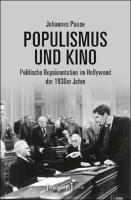Populismus und Kino
Politische Repräsentation im Hollywood der 1930er Jahre
| dc.contributor.author | Pause, Johannes | |
| dc.date.accessioned | 2023-01-27T15:09:14Z | |
| dc.date.available | 2023-01-27T15:09:14Z | |
| dc.date.issued | 2023 | |
| dc.identifier | ONIX_20230127_9783839465400_48 | |
| dc.identifier | OCN: 1349274672 | |
| dc.identifier.uri | https://library.oapen.org/handle/20.500.12657/60993 | |
| dc.language | German | |
| dc.relation.ispartofseries | Film | |
| dc.subject.classification | thema EDItEUR::A The Arts::AT Performing arts::ATF Films, cinema::ATFA Film history, theory or criticism | en_US |
| dc.subject.classification | thema EDItEUR::J Society and Social Sciences::JB Society and culture: general::JBC Cultural and media studies::JBCT Media studies | en_US |
| dc.subject.classification | thema EDItEUR::J Society and Social Sciences::JP Politics and government::JPF Political ideologies and movements | en_US |
| dc.subject.other | Film | |
| dc.subject.other | USA | |
| dc.subject.other | Populismus | |
| dc.subject.other | Politik | |
| dc.subject.other | Great Depression | |
| dc.subject.other | Politische Repräsentation | |
| dc.subject.other | Demokratie | |
| dc.subject.other | Bildsprache | |
| dc.subject.other | Szenographie | |
| dc.subject.other | Hollywood | |
| dc.subject.other | Exzeptionalismus | |
| dc.subject.other | Postfaktischer Populismus | |
| dc.subject.other | Konservatismus | |
| dc.subject.other | Amerika | |
| dc.subject.other | Politische Ideologien | |
| dc.subject.other | Kulturgeschichte | |
| dc.subject.other | Medienwissenschaft | |
| dc.subject.other | Populism | |
| dc.subject.other | Politics | |
| dc.subject.other | Political Representation | |
| dc.subject.other | Democracy | |
| dc.subject.other | Visual Language | |
| dc.subject.other | Scenography | |
| dc.subject.other | Exzeceptionalism | |
| dc.subject.other | Postfactual Populism | |
| dc.subject.other | Conservatism | |
| dc.subject.other | America | |
| dc.subject.other | Political Ideologies | |
| dc.subject.other | Cultural History | |
| dc.subject.other | Media Studies | |
| dc.title | Populismus und Kino | |
| dc.title.alternative | Politische Repräsentation im Hollywood der 1930er Jahre | |
| dc.type | book | |
| oapen.abstract.otherlanguage | Die 1930er-Jahre gelten als das populistische Jahrzehnt Hollywoods. Regisseure wie Frank Capra, Leo McCarey und John Ford entwerfen in ihren Werken Szenarien geglückter oder gescheiterter politischer Repräsentation, in denen sich demokratische Ideale mit politischer Theologie und amerikanischem Exzeptionalismus verbinden. Die Szenographie dieser Filme hat sich tief in das kulturelle Gedächtnis der USA eingeschrieben und prägt die politische Inszenierung von Repräsentation bis heute. Johannes Pause liest die damals entstandene Bildsprache als eine Typologie populistischer Repräsentation neu und nutzt sie als Folie, um aktuelle politische Tendenzen zu analysieren. | |
| oapen.identifier.doi | 10.14361/9783839465400 | |
| oapen.relation.isPublishedBy | b30a6210-768f-42e6-bb84-0e6306590b5c | |
| oapen.relation.isbn | 9783839465400 | |
| oapen.relation.isbn | 9783837665406 | |
| oapen.relation.isbn | 9783732865406 | |
| oapen.imprint | transcript Verlag | |
| oapen.pages | 198 | |
| oapen.place.publication | Bielefeld |

